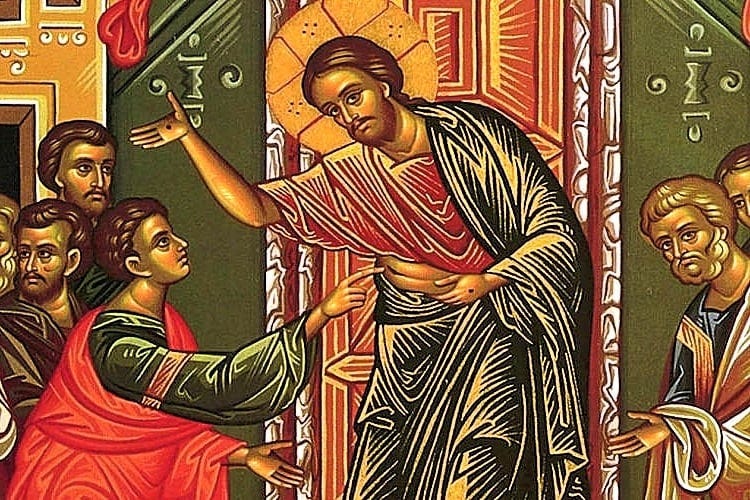
“Peace I leave with you,” the Lord said in John 14:27. Did He leave peace with us, though? It sure doesn’t seem like it sometimes.
The National Catholic Register reported that anti-Christian hate crimes are up 44% in a single year. Open Door’s “World Watch List” shared that more than 365 million Christians faced “very high or extreme” levels of persecution last year. This means that one in seven Christians has experienced excessive physical violence because of their faith. Nearly five thousand of these experiences resulted in death. Pretty much all of them happened in African and Asian countries.
Strangely, looking at the color-coded map, North America and Europe are greyed, which means that the kind of active persecution intent on snuffing faith entirely is nearly non-existent. I wondered about this.
But not for long.
Apart from the proof that much of mainstream Christianity’s doctrine is meme-generated, I mentioned in my sermon on Easter Sunday that countries like ours aren’t exactly robust targets for the Devil when it comes to battling faith. We’ve proven more than capable of battling it ourselves. A few examples…
In stride with its neighboring European countries, and for starters, Scotland’s parliament just made misgendering someone a criminal offense punishable by up to seven years in jail. It received vocal support from no small number of churches. Across the Atlantic in North America, Canada has been experiencing this same scenario for years. Just south of Canada’s border, here in the United States, we’re certainly not far behind. Christian pastors bless Planned Parenthood clinics, claiming Jesus was pro-choice while defending a mother’s so-called right to kill her unborn child up to and after birth. I was at this year’s State of the State address in Michigan. The Invocator, a Christian pastor, spoke this way. Should I expect anything different? Just shy of 60% of Michigan’s pew sitters elected state leaders who continue to make this infanticide possible. Those same leaders support children undergoing chemical castration and the criminalization of protesting parents. Add to that their targeting of Christian businesses and non-profit organizations for adhering to Christian doctrine.
Still, so many American Christians yawn.
I also mentioned in my Easter sermon two weeks ago that as a nation, our own president, Joe Biden, is proof that the Devil is likely disinterested in us. He already has one of his faithful in the White House, and with that, he can labor elsewhere. Even as a self-described (in every sense of the word) devout Catholic, Biden went out of his way to declare Easter Sunday to be “Transgender Day of Visibility.” Cardinal Wilton Gregory, the archbishop of the Archdiocese of Washington D.C., called Biden a “cafeteria catholic,” meaning he picks and chooses what he wants to believe. That could’ve been a zinging indictment if it didn’t also apply to most of mainstream American Christendom.
Either way, I chose to push back against Biden’s executive proclamation rather crisply from the pulpit. Interestingly, after the service, I was met with a visitor’s venom, insisting before an observing line of exiting worshippers I was a bigot. As you can see, I’m still thinking about it a few weeks later.
Oh well. For some of us, it goes with the territory, becoming little more than sticks-and-stones-may-break-my-bones and all that. Still, I suppose I got off easy by comparison. I read about someone burning a trailer filled with Bibles in front of a church in Tennessee on Easter morning. Unsurprisingly, the media let it slide. The usual suspects at the helm of American culture who did mention it said things like, “Any church preaching hate should expect some level of backlash.” And by “preaching hate,” the lesbian commentator who remarked meant anyone who doesn’t believe as she believes when it comes to human sexuality, or worse, who publicly teaches what the Bible teaches about sin, gender, life, and other topics.
As I said, I wondered about America not making the persecution cut. But only for a moment. I think we’re already doing the Devil’s dirty work for him. There’s really no need to behead anyone for faith in Christ when the mouths on those heads couldn’t tell you much about Him. I can’t tell you how many posts from Christians I saw (and still see) claiming a connection between Easter and Ishtar. The ignorance in our churches of Christian history and its vernacular is absolutely astounding. But again, what should one expect from a Christianity that learns its theology from the internet? What should one expect from a Christianity that wants to look and feel like the culture in almost every way rather than being the holy body of Christ, distinct and set apart from the world?
Maybe to frame what I mean, imagine if I walked into a rock concert wearing jeans and a T-shirt. No one would care. But if I walked into that same concert wearing my alb, stole, and chasuble, people would probably notice and be put off by it. That said, it seems too many people in too many churches would be put off by it, too, preferring a pastor in rock concert attire. But it’s not only that the Church and the world are to be noticeably different. Our vocabulary is different, too. We communicate using terms like catechesis, Sanctus, Tenebrae, kyrie, sacrament, and Agnus Dei. Moreover, we move differently. We carry processional crucifixes. We bow our heads when the Lord’s name is spoken. We do things like make the sign of the cross and sing sacred scripture to one another. We prefer church names that could never be mistaken for nightclubs, but instead, teach what we believe, names like Holy Trinity, Redeemer, and Our Savior.
Side by side, the Church and the world look very little alike. Even further, the world isn’t going to hate itself. It’s going to hate what is apart from it. And it won’t stand idly by when something is snatched from it. Indeed, the Lord told us these things, saying, “If the world hates you, know that it has hated me before it hated you. If you were of the world, the world would love you as its own; but because you are not of the world, but I chose you out of the world, therefore the world hates you” (John 15:18-19).
This leads us back to where I began: persecution.
Ann Landers once said something relatively intuitive. She wrote to one of her readers, “Don’t accept your dog’s admiration as conclusive evidence that you are wonderful.” I know what she meant in context, but in this instance, it had me thinking in a different direction. Just because your dog loves you doesn’t mean you’re wonderful. And so, the absence of the types of overt persecution happening elsewhere in the world might not be a sign that things are okay. It could just be that the world is disinterested in paying much attention to what it believes it already owns. Or, at a minimum, it sees American Christianity as a form of spirituality that can be easily molded to its liking.
Maybe.
I suppose, in conclusion, the Lord did say, “Peace I leave with you.” But that’s not all He said. The complete text of John 14:27 is, “Peace I leave with you; my peace I give to you. Not as the world gives do I give to you. Let not your hearts be troubled, neither let them be afraid.”
The Lord said this because He knew the Church on earth would exist perpetually in an unsettling time of oppression. Still, Jesus gives His believers peace. It’s not the peace we might expect, as in the absence of conflict. It’s the kind of peace that can endure persecution’s fires, no matter how hot they get. It’s also the kind of peace that inevitably draws the world’s attention. This is true because it tends to speak up even when doing so is dangerous. By the power of the Holy Spirit at work for faith in Christ, believers have this peace. It settles a troubled heart and smothers fear, just as Jesus said. How could it not, especially when the One who promised it also conquered the last and most terrifying enemy, death (1 Corinthians 15:26)? If not even death holds dominion over us, what else is there to fear?
You know the answer.









